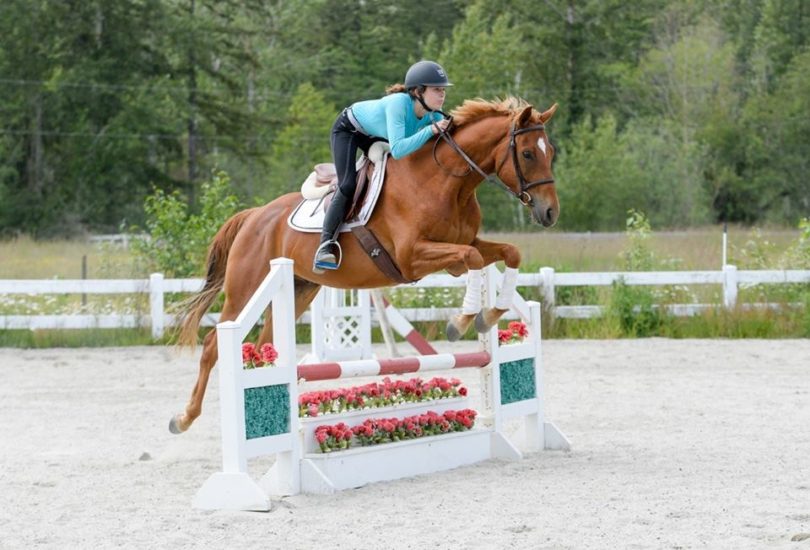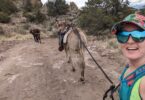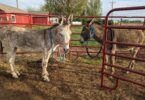Break into the equestrian world without breaking the bank with our simple strategies for horse riding on a budget.
Horseback riding is one of the least accessible sports to the average person with an average income. The cost can be incredibly prohibitive, and that’s without factoring in the additional costs of being a competitive rider.
Riding and showing horses on a budget is possible, but you need to get creative. Strategies like bartering for lessons, thrift shopping, and splitting hauling fees to shows are just a few ways to stretch each dollar.
In this article, I share tips for how you can be part of the horse world on a tight budget. We’ll discuss:
- How to Afford Horse Riding Lessons
- How to Afford Horse Riding Gear
- How to Show Horses on a Budget
- How to Keep a Horse on a “Low” Budget
At the start of your horse journey? Learn How Much Horses Cost & How You Can Actually Afford One.
Tips for Horse Riding on a Budget
How to Afford Horse Riding Lessons
One of the most common challenges is affording horseback riding lessons. Quality instruction is worth its weight in gold, but staying on a weekly lesson schedule can run $150-$400 per month.
Pro Tip: Taking semi-private or group lessons (vs. private) can save a lot of money over the long run.
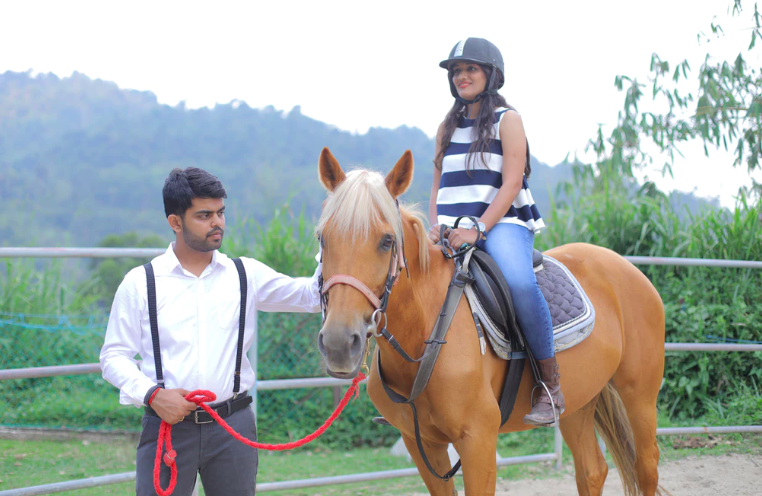
Lessons are a great way to expand your skills and get the most out of your horse time.
Developing a good relationship with your trainer can also save you money.
They can keep an ear out for work opportunities, help your horse stay healthy (and out of the vet’s office), and may have gear or apparel you can borrow or rent.
Dress for success with our 13 Best Horseback Riding Boots for Lessons.
If you DO have prior horse experience:
Many people used to ride but had to stop due to lack of funds, life circumstances, or career commitments. Returning to the horse world later on can be intimidating (especially if you have school loans, mortgage payments, etc.).
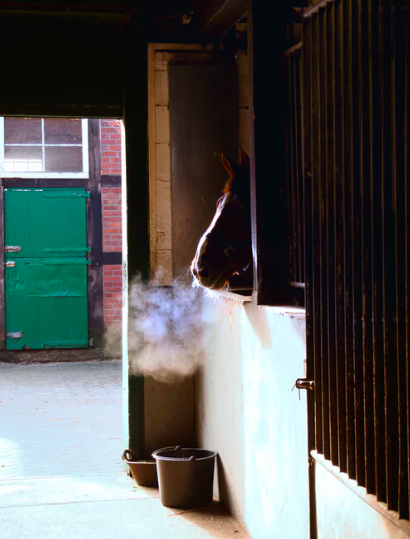
Trading barn work for lessons is a win-win.
Luckily, working with horses is like riding a bike — it’s a lot quicker to relearn it. Put your experience to good use by exchanging work around the farm/ranch for lessons.
Most barns have more work than workers, and you can offer to help clean stalls, feed horses, and do other odd jobs.
When it comes to bartering sweat equity for lessons, be patient until you find the right situation.
How to get started:
- Facebook groups. Join local horse community Facebook groups, and watch for job postings. Or, make your own “ad” detailing the type of exchange you’re searching for. (Remember to be SAFE when communicating with strangers online.)
- Online community boards. Sites like Craigslist share job opportunities and allow you to promote your skills and invite people to contact you. (Same safety reminder!)
- Word of mouth. Do you know any horse people in your area? Ask them if they know of any bartering opportunities (or paying gigs) and/or if they’ll help spread the word about your skills.
- Local equestrian facilities. Look up local lesson barns online and give them a call. Do NOT show up unannounced, as horse people are busy and typically don’t appreciate strangers wandering around their properties. Call or email first. If they’re interested, you can arrange an appointment.
Keep an open mind:
Established lesson programs aren’t the only way to expand your skillset. You may find experienced horse people who don’t offer public lesson services, but do need their horses exercised on a regular basis.
They may be willing to arrange a work trade in exchange for exercise riding.
Depending on the situation and your personal goals, these exchanges may offer more “bang” for your buck (work). Some traditional lesson facilities can be a bit stingy about what they offer in exchange for labor.
Just make sure your hourly rate and the amount of work you put in are equal to what you receive in return.
Another creative option? Learn How to Be a Star Working Student Equestrian.
If you do NOT have previous horse experience:
The previous suggestions are still workable even if you have no prior horse experience. It can be harder to land a job in a barn without horse experience, however, since horses require a fair bit of prior knowledge to handle safely.
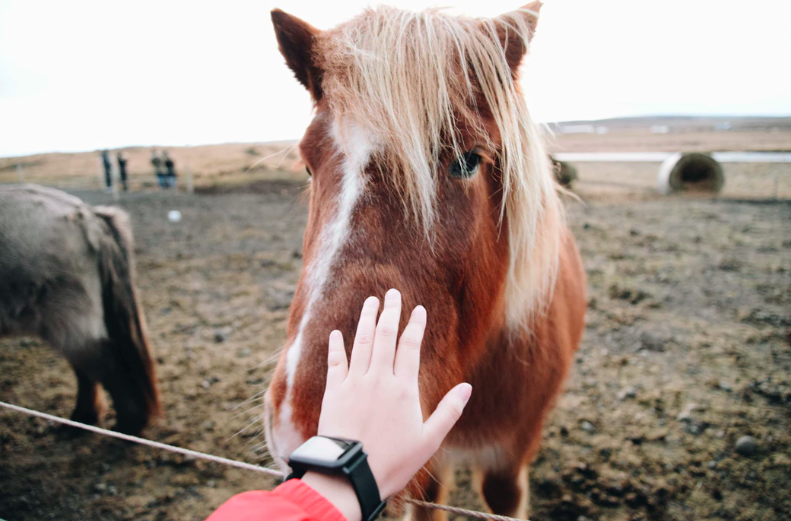
The more horse experience you gain, the more opportunities you’ll have.
That said, some barns are willing to train you or have jobs that are less hands-on until you gain necessary experience.
Alternatively, there are other options that do require financial output, but allow you to gain the horse experience necessary for more desirable positions.
How to get started:
- Buy lesson packages. Ask barns if they offer discounted lesson packages. Many offer a lower rate per lesson if you pay up front for several sessions at a time. The upfront cost is more, yes, but you can save quite a bit of money in the long term.
- Take odd jobs that are not horse related. If you’re younger, be sure to confirm what the legal age to work is in your community. Try babysitting, pet sitting, waitressing in restaurants, working retail, or doing yard work and other odd jobs for your neighbors.
- Find hobby farms that need horses handled and groomed. Tell them you want to learn about riding and handling horses. Even if their horses are not safe for beginners to ride, you may be able to learn the basics of horse handling and care by shadowing experienced people and handling animals from the ground. Facebook groups and community boards are great places to find small acreage operations. Or, go the old-fashioned route and post signs so people can get in touch.
Want to know what horses cost in real life? Check out our monthly horse expense reports.
How to Afford Horse Riding Gear
Whether you take lessons or not, you’re probably also wondering how the heck to afford all of the gear you need to ride. (Been there!)
Hands down, the best way to afford riding gear is to be THRIFTY.
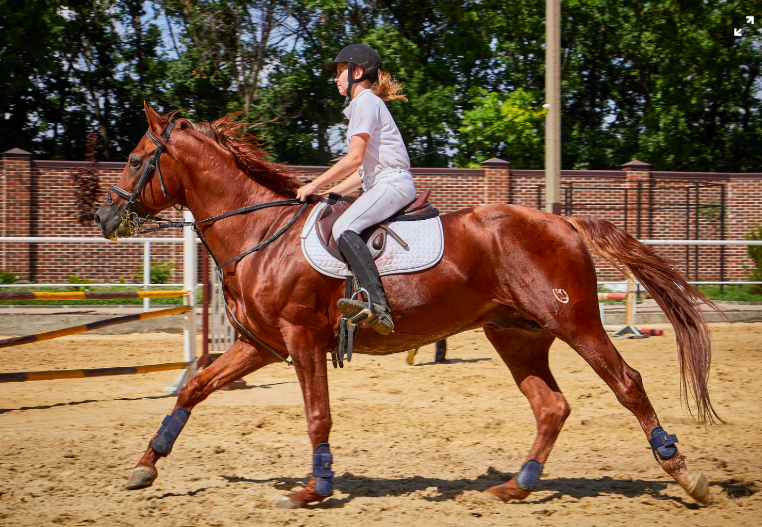
You can grow your gear collection slowly over time.
How to get started:
- Shop sales. Do not pay full price at tack stores, even if you want to buy new gear. Wait for local sales events, compare prices and browse clearance items at online tack sites like State Line Tack.
- Buy used. This is the BEST way to save money on gear. I have the best luck in local horse Facebook groups, as well as on Craigslist and Ebay. You can get new or barely used items for well under retail price. You may have to be patient and do a lot of scrolling, but your wallet will be well rewarded.
- Browse thrift stores. Believe it or not, a lot of non-horse stores have clothing items that are acceptable for schooling or even showing. It isn’t uncommon to find equestrian specific gear at thrift shops either! Be patient, thrift often, and you’re more likely to strike gold.
- Rent or borrow. If you know any horse people, consider renting or borrowing their gear. Some people stop riding but haven’t taken the time to resell their gear — or they want to hold onto it in case they return to the sport later. They may be willing to loan you equipment.
Equestrians have a lot of gear, but what do you really need? Check out our Horse Riding Gear for Beginners.
How to Show Horses on a Budget
Riders who want to compete, or those who hope to show in the future, face even larger financial hurdles.
You don’t need to compete at rated shows to get valuable experience and have fun.

Be strategic about how you compete, and you’ll save a lot of money.
If your budget only allows for a few lower level schooling shows and other types of unrated shows, don’t sweat it. These events are typically more welcoming, laid back, low cost, and low stress.
Schooling shows are also usually closer to home, so you’ll spend less on gas/hauling to get there.
How to get started:
- Stick to one day shows. A lot of one day shows, particularly schooling shows, have lower day rates and/or per-class fees. (At the very least, you save by not having to shell out cash for stabling.)
- Haul in. If you have your own trailer, save on stabling costs for multi-day shows by hauling in daily to local shows.
- Go with friends. Plan your show schedule around your barn’s show calendar or friends’ schedules who may have an extra spot in their trailer to haul your horse. “Carpooling” will save a lot on hauling costs, plus you get to show with friends!
- Keep working. Sign up for class times around your work schedule so you don’t have to take a full day off work to show. Just remember that horse shows often (always…) run behind, so give your self plenty of buffer time.
- Share horses. Two riders and one horse? That’s a cheaper show for everyone! Consider sharing costs with the owner of your lease horse — or offer another rider the opportunity to compete on your horse in a few classes. Splitting show fees and stabling 50/50 will save you TONS.
On show days, I usually wake up early and work in the morning prior to competing. I can alleviate some of my cost by not forgoing a day’s paycheck.
Using smaller shows to build your competition confidence ensures that by the time you can afford rated shows, you and your horse will make the most of it.
Heading to a show? Use our Ultimate Packing and Horse Trailering Checklist to be sure you bring all the essentials.
How to Keep a Horse on a Low Budget
What about horse owners (or aspiring horse owners) who who need ways to “horse” on a budget? I see you guys, and I’m one of you.
You probably feel like you don’t fit into the sub-set of exorbitantly wealthy people in the horse world.
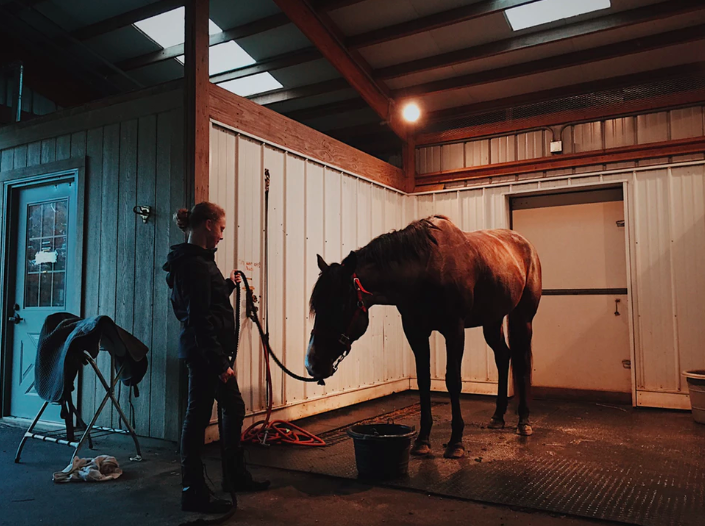
Smaller facilities can be a wonderful alternative to expensive show barns.
I’ve been the “poor” kid at the barn for much of my riding career.
I use the word “poor” exceptionally lightheartedly because, in the horse world, it can simply mean you can’t buy the full range of matchy-matchy shirts, saddle pads, bonnets, and boots from Le Mieux, blow $10,000 per year on shows, or pay $2,000 per month to board at a barn that includes full training (and chandeliers).
If you’re already pinching pennies to afford your equestrian dreams, this won’t come as a surprise. The best way to have horses on a budget is good ‘ol fashioned sacrifice.
How to get started:
- Extend your commute. Do you live in a major city, a bustling horse hub, or an area where prices are inflated due to cost of living? You’ll likely save money if you’re willing to drive a little further to find cheaper boarding options outside your immediate area. (Make the most of that extra time by listening to equestrian podcasts!)
- Prioritize. If you want to save money on board, let go of having a heated indoor, or an indoor arena at all, on your facility must-have list. I haven’t boarded anywhere with an indoor arena for many years because those facilities are far more expensive. Instead, find local arenas that allow you to haul in for a small fee when it’s too cold or rainy to ride at home.
- Get outside. You don’t need to pay stall board, especially for fancy stalls. The vast majority of horses are perfectly happy being outside in a field with their friends (provided they have proper food, water, and shelter). In fact, most of them are far MORE happy in this setting. Pasture board also lowers your costs substantially.
- Do your own chores. If you have more time than money, look into self or semi-board options instead of full-service board. These barns offer a discounted rate if you handle things like feeding, blanketing, and mucking out for your own horse. (If you can’t get out there every day, look into full or co-op boarding option.)
- Stay small. Staying away from large, “popular” facilities and boarding at private or “hobby” style facilities will also save money. (Typically, smaller barns also tend to reduce how out of place you feel if you’re not swimming in cash.)
- Insure your horse. Yes, policies cost money, but the best equine insurance plans can also be a lifesaver when it comes to major vet bills. For example, $5,000 worth of medical coverage may only cost you $30 per month, depending on the value of your horse, their age, and other factors. (You may also want to consider equine liability insurance in case your horse damages property or hurts someone.)
Insuring your horse can feel complicated, but it doesn’t need to be. Check out our Beginner’s Guide to Equine Insurance.
When it comes to keeping your horse, finding a facility that put’s your horse’s safety and health first is key. But, it’s a close second to choose a barn where the people are friendly, supportive, and share your values.
A wonderful barn family is priceless.
Money Doesn’t Grow in Horse Pastures
Riding and showing horses on a budget is hard, there’s no denying it. If you cannot immediately afford all of your horsey dreams, join the club! There are still plenty of ways to adjust your situation (and mindset) to enjoy an equestrian life within your means.
Don’t get discouraged — get creative.
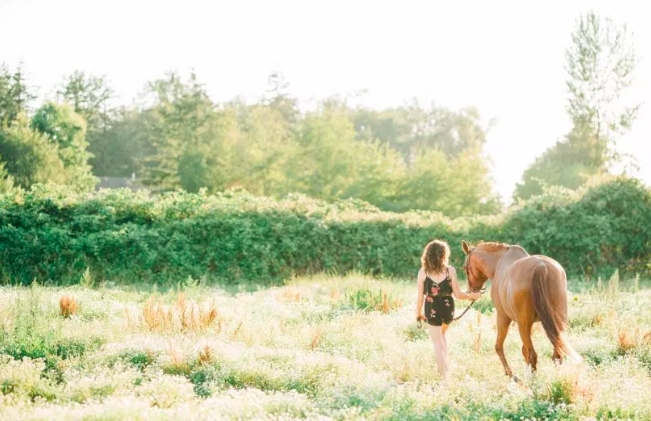
You don’t need to be wealthy to enjoy horses.
In addition, the more we talk about the lack of access to our sport and the often unrealistic cost of entry for the average person, the more change we will incite together.
We can all help pave the way for riders who come from less money.
Less wealthy equestrians deserve to experience a magical connection with horses just as much as those with overflowing bank accounts.
If you really love horses and want them in your life, you can make it happen. Hopefully these tips will help!
Happy Trails,
Shelby & Milo
If you’d like to follow more of my journey, you can find me:
On YouTube
Online at Milestone Equestrian
On Instagram
On Twitter
P.S. Enjoy this article? Trot on over to:
- How Much Horses Cost & How You Can Actually Afford One
- I Want a Horse But Can’t Afford One (Now What?)
- Estimate Your Average Horse Cost (State by State)
- Horse Rookie Equestrian Media Guide: Shelby Dennis Horse Vlog
- Expert Tips on How to Create the 3 Easiest Mane Braids
- Bit(Less) is More: Bitless Horseback Riding for Beginners
- Horseback Riding: What to Wear (With Pictures)
- 4
Dressage Fashion Trends & Salute-Worthy Styles - 60 Questions to Ask When Buying Your Dream Horse
- 9 Rookie Approved Horseback Riding Boots for Beginners
- Shelby Dennis on the 15 Best Equestrian Vloggers
6145

